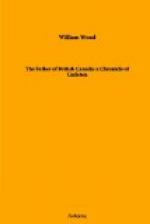Carleton’s is the only personality which links together all four decades—the would-be American sixties, the French-Canadian seventies, the Anglo-French-Canadian eighties, and the bi-constitutional nineties—though, as mentioned already, Murray ruled Canada for the first seven years, 1759-66.
James Murray, the first British governor of Canada, was a younger son of the fourth Lord Elibank. He was just over forty, warm-hearted and warm-tempered, an excellent French scholar, and every inch a soldier. He had been a witness for the defence of Mordaunt at the court-martial held to try the authors of the Rochefort fiasco in 1757. Wolfe, who was a witness on the other side, referred to him later on as ‘my old antagonist Murray.’ But Wolfe knew a good man when he saw one and gave his full confidence to his ‘old antagonist’ both at Louisbourg and Quebec. Murray was not born under a lucky star. He saw three defeats in three successive wars. He began his service with the abortive attack on pestilential Cartagena, where Wolfe’s father was present as adjutant-general. In mid-career he lost the battle of Ste Foy. [Footnote: See The Winning of Canada, chap. viii. See also, for the best account of this battle and other events of the year between Wolfe’s victory and the surrender of Montreal, The Fall of Canada, by George M. Wrong. Oxford, 1914.] And his active military life ended with his surrender of Minorca in 1782. But he was greatly distinguished for honour and steadfastness on all occasions. An admiring contemporary described him as a model of all the military virtues except prudence. But he had more prudence and less genius than his admirer thought; and he showed a marked talent for general government. The problem before him was harder than his superiors could believe. He was expected to prepare for assimilation some sixty-five thousand ‘new subjects’ who were mostly alien in religion and wholly alien in every other way. But, for the moment, this proved the least of his many difficulties because no immediate results were required.
While the war went on in Europe Canada remained nominally a part of the enemy’s dominions, and so, of course, was subject to military rule. Sir Jeffery Amherst, the British commander-in-chief in America, took up his headquarters in New York. Under him Murray commanded Canada from Quebec. Under Murray, Colonel Burton commanded the district of Three Rivers while General Gage commanded the district of Montreal, which then extended to the western wilds. [Footnote: See The War Chief of the Ottawas, chap. iii.]
Murray’s first great trouble arose in 1761. It was caused by an outrageous War Office order that fourpence a day should be stopped from the soldiers to pay for the rations they had always got free. Such gross injustice, coming in time of war and applied to soldiers who richly deserved reward, made the veterans ‘mad with rage.’ Quebec promised to be the scene of a wild mutiny. Murray, like




